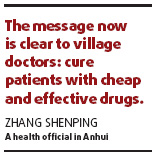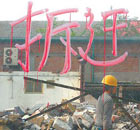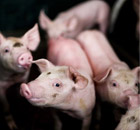Society
Cheaper medication in store
By Shan Juan (China Daily)
Updated: 2010-01-27 07:35
 |
Large Medium Small |
HEFEI: Penicillin, one of the first and most effective antibiotics, is set to help patients at rural hospitals and clinics again as part of ongoing healthcare reform.
The antibiotic, one of the cheapest of its kind, was previously disappearing from under-subsidized hospitals across the country which were struggling to survive by selling expensive drugs, experts said.
| ||||
"Reform measures including more government financial support, stringent supervision and punishment of over prescription have enabled us to now prescribe cheap and effective drugs like penicillin to patients according to their conditions," said Wang Yugen, leading doctor of the Shibu village clinic in Huagang town of Anhui province. The clinic is staffed with three workers, the smallest unit in the State health institution system.
Among all antibiotics now used at the clinic, which covers 2,600 local residents made up of mostly farmers and migrant workers, penicillin accounts for about 65 percent, according to Wang. The figure was less than 25 percent years ago.
Nationwide abuse of antibiotics is rampant particularly at cities mainly for profit, experts said. Bacteria has also become increasingly drug-resistant, a serious problem that the World Health Organization says jeopardizes human safety.
"Doctors tend to prescribe expensive, new generation of antibiotics even if they are not necessary, so old ones like penicillin was fading out," said Zhao Minggang, a division director with the Ministry of Health.
The change in the situation began to emerge last year in rural areas, when the government began to fully fund the operation of the grassroots clinics while prohibiting them from making profits by selling drugs.
The change did not come easy, Wang said.
"We found it hard to use cheap drugs - the doctors had been used to over-prescription for nearly two decades when the government had stopped fully subsidizing public hospitals and introducing a business-orientated system," he said.
Drug selling had accounted for more than 70 percent of the total annual income in the past years, without enough government subsidy at the poorly equipped three-room clinic, according to the veteran village doctor who now makes 500 yuan ($74) a month.

"The message now is clear to village doctors: cure patients with cheap and effective drugs," said Zhang Shenping, deputy director of the health bureau of Hefei, capital of Anhui.
Jiang Erfeng, 65, said the benefit was already evident from the latest medical bills.
"Previously, treating a common cold here would cost more than 60 yuan. That has now dropped to about 20 yuan," she said. "With the outpatient reimbursement from my insurance policy, I paid just 11 yuan or so," she said.
The government invested heavily to establish the New Rural Cooperative Medical Scheme in 2003. So far, about 830 million rural residents have joined the program voluntarily.
The annual premium is about 100 yuan per capita nationwide. It is shared by participants and the central and local governments.











